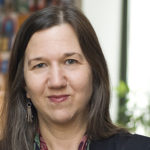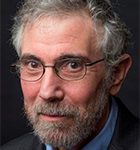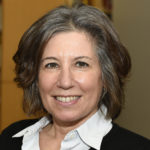By Stone Center Senior Scholars
Spotlight on Policy
Stone Center faculty, each with unique expertise in the study of inequality, offer insights on the COVID-19 crisis.
 Miles Corak is an expert on the relationship between social mobility and inequality:
Miles Corak is an expert on the relationship between social mobility and inequality:In a medical sense, COVID-19, as highly contagious as it is, can be thought of as the great leveler. No one has immunity, and we face the health risk of this virus with a sense of our common humanity. But in a socio-economic sense, it is not as contagious. The jobs some of us hold give us economic immunity, and we face the economic risk of this virus with a very different sense of our interconnectedness.
For many families, wage inequality means an insecure standard of living and lower prosperity for the next generation. But if you have a job, even if you need more than one to stay afloat, there is always a sense of hope, a shred of dignity, the aspiration of the American Dream. Income inequality is easier to ignore in a full employment economy. We now have an opportunity for empathy with many people who individually confront risks that repeat over and over during the course of their lives, accumulating bad draws that lead to lower and more precarious incomes, less stable and lower quality housing, and less secure families.
In much of this there is no question of merit and just deserts; it’s just bad luck. Inequality has been robbing many Americans of security, prosperity, and dignity for decades. That is what COVID-19 reveals.
 Janet Gornick has spent the last four decades studying U.S. social welfare policies and how they compare to those of other rich countries:
Janet Gornick has spent the last four decades studying U.S. social welfare policies and how they compare to those of other rich countries:The COVID-19 crisis has cast a bright light on the United States’ broken welfare state. Longstanding weaknesses and manageable inconveniences are now gaping holes — holes that are putting millions of workers and their families at risk. Without adequate publicly supported childcare, school closures press many essential workers to leave their children unattended. Without widespread publicly guaranteed paid sick leave — note, the new emergency law excludes approximately 20 million workers — many who are sick (or worried that they may be) are forced to head to work, risking their health and exposing others. Without policies enabling or requiring employers to maintain at least partial hours and pay (as we’ve seen in other countries), many employees face drastic earnings losses, placing them and their families at risk of poverty, food insecurity, and housing instability. Without universal health insurance, independent of current employment, millions of workers have suddenly joined the ranks of the uninsured.
These longstanding U.S. policy weaknesses are now interacting and compounding one another; the result is deeper inequality, worsened public health, and avoidable death. Many other rich countries have strong safety nets that are effectively lessening the hardships that are now ravaging the United States. Ideally, this crisis will catalyze intensified demands in the United States for an end to these unnecessary institutional failures.
 Paul Krugman is known for his work on macroeconomics and his op-ed columns for The New York Times:
Paul Krugman is known for his work on macroeconomics and his op-ed columns for The New York Times:I’ve been focusing on the macroeconomics of COVID-19, whose effects are both quantitatively and qualitatively different from anything we’ve seen before. On the quantitative side, it looks as if the unemployment rate will rise two or three times as much in a single month as it did during the whole of the financial crisis, reaching levels not seen since the Great Depression. On the qualitative side, this slump doesn’t fit any of the usual categories. I’ve been comparing it to a medically induced coma: we’ve shut down a large part of the economy in an attempt to slow the spread of the virus. None of our usual ideas about economic stimulus make sense when the slump is deliberate and necessary.
There’s also a huge inequality side to this: for some people (like me!) this is just annoying, but tens of millions face financial ruin. I and others have been working hard on figuring out how to think about all this, and how policy should respond. I think we’ve made gratifyingly fast intellectual progress. Whether it will be reflected in policy is more of a question.
 Leslie McCall studies public opinion about inequality, opportunity, and related economic and policy issues:
Leslie McCall studies public opinion about inequality, opportunity, and related economic and policy issues:I can’t help but view this crisis through the lens of the memory care facility where my mother now lives. Even during the“normal” winter of 2019 when I was searching for a facility, I wanted to know: Do the caregivers receive a fair wage and benefits package? Is turnover low? Is the facility nonprofit? In retrospect, I asked surprisingly few questions about the everyday details of care; I figured that a well-treated and respected workforce would automatically result in a better situation for my mother. I still think that’s true, and the evidence supports it, but it also minimizes the extraordinary care and vital services that are provided disproportionately by people of color and women even when their pay and working conditions are poor.
Discussions of policy solutions to the horrific problem of inequality in this country too often revolve solely around the question of government redistribution through the tax and transfer system. Yet it’s the injustices rooted in the vast low-wage sector that move people. Majorities, and sometimes large majorities, have long supported policies that would reduce inequality in pay, benefits, and working conditions. The tax and transfer system will play a part in that, of course, but it is not the ultimate or only goal, a lesson I hope will gain greater traction in the coming months and years.
 Branko Milanovic researches income inequality in individual countries and globally, including preindustrial societies:
Branko Milanovic researches income inequality in individual countries and globally, including preindustrial societies:What can we say about the impact of COVID-19 on the global distribution of income? It is hard to say anything meaningful now, because we have no idea how long the pandemic will last, how many countries will be affected, how many people will die, whether the social fabric of societies will be ripped apart or not. Most of what we say today may be proven wrong tomorrow. If someone is right, it may not necessarily be because they are smart, but because they are lucky.
Measures of global growth show that the negative effects of the crisis on growth will be very strong. But it will not affect everyone in the same way. If the economic decline will be most severe in the United States and Europe — as it appears now — the gap between large Asian countries and the rich world would be reduced. This is the main force that has led to the reduction in global inequality since approximately 1990. Like after 2008-2009, the reduction in global inequality will be achieved not through the “benign” forces of positive growth in both the rich and the emerging economies of Asia, but through the “malignant” forces of negative growth in the rich countries.
 Salvatore Morelli, the director of The GC Wealth Project, focuses on the estimation and evolution of personal wealth concentration:
Salvatore Morelli, the director of The GC Wealth Project, focuses on the estimation and evolution of personal wealth concentration:The COVID-19 crisis will have unprecedented repercussions on the economy as well as large and complex distributional impacts. Available evidence suggests that major historical macroeconomic and financial shocks generally had relatively small and short-lived effects on income and wealth distribution. Yet this may well be one of those rare events in history where a crisis leads to structural changes in institutions and policies.
Will government gain wider intervention space in the economy via a reformed role in social protection? Will the growing public debt generated by the management of the crisis be partially reabsorbed by progressive taxes on income and wealth? Will the global supply chain be partially and permanently disrupted? How will preferences for consumption and saving adjust? What will happen to those “low skilled/low productivity” and often marginalized workers who are now deemed“essential” to our own existence? Will they gain bargaining power and a renovated social recognition? Will social norms about highly unequal remuneration change? Will some countries transition from a democratic to an authoritarian government? The answers to these complex questions will shape our future economy and society, and depend not only on the impact of the initial crisis but also on the policy responses of governments and monetary authorities.
Related Commentary: Check out our page on the COVID-19 Crisis and Response

